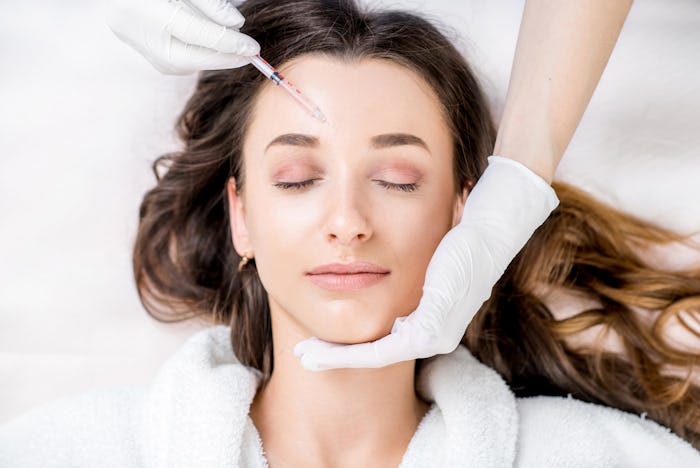Life
7 Surprising Long-Term Side Effects Of Botox You Need To Know
Though it might not be quite as popular as it once was, many people do still opt to use Botox as a wrinkle eraser as they start to notice signs of aging on their faces. And in some cases, depending on when you start noticing these signs of aging, you might be using Botox for quite a long time. Whether you're using Botox long-term for its anti-aging qualities or for one of the many other uses that doctors can sometimes recommend it, there are some surprising long-term side effects of Botox you need to know about that are different than the short-term side effects that you may have heard about in the past.
In addition to combating wrinkles, Healthline reported that doctors have recommended Botox for all manner of conditions ranging from depression to migraines, overactive bladder, hyperhidrosis, and more. For any of these conditions, as well as for anti-aging purposes, you could potentially be using Botox for a fairly long time, so that makes it even more important to have some sort of idea for how Botox might affect you later on, specifically. Although there is some information that's known about how Botox might affect you long-term, more research is likely needed if it's going to continue to be a regularly-used treatment, and, particularly, if the number of conditions that it's used for continues to expand.
1The Muscles In Your Face Will Get Weaker
Dr. Caroline A. Chang, MD, FAAD, a clinical assistant professor of dermatology at Alpert Medical School of Brown University, tells Romper via email that, with continued use over time, the muscles in your face will weaken. That means that you might not need to use Botox as frequently, she explains. So while you might not be quite as expressive as you otherwise would be, you also might not get the lines and wrinkles that lead you to seek out Botox in the first place. It's not all bad, but it's not all good.
2The Treatment Might Be More Effective
A 2015 study published in the journal Toxins (Basel) found that the treatment was more effective long-term for those who used Botox repeatedly. So that means that using it once or twice and never again might not be the best way to go about it, but that, if you like it and your doctor agrees you should continue with it, using it more regularly might actually give you a better result.
3It Might Infiltrate The Central Nervous System
In 2015, researchers from the University of Queensland found that Botox might not stay where it's injected, as Science Daily noted. Researchers found that Botox might be able to move and be transported into your central nervous system. More research on this is definitely needed because Botox is a neurotoxin.
4It Might Make Your Skin Look Thinner
After repeated use, Botox might also make your skin appear thinner. In an interview with Byrdie, Dr. Patricia Wexler, MD, a dermatological surgeon, said that while this isn't typical, if you start using Botox in your early 20s, there might be a greater chance that you'd have this happen to you. It's not likely, but it can happen.
5After A Certain Number Of Injections, Side Effects Might Increase
A 2015 systematic review published in Pharmacology found that some people will experience more side effects after the tenth or eleventh injections. It also concluded that people using Botox for treatments of conditions, rather than for cosmetic purposes, might be at a greater risk.
6The Veins In Your Face Might Be More Obvious
Chang also says that the veins in your face might be more obvious and apparent with continued use. "Muscle atrophy can cause changes in facial contouring so it is important to maintain good skin care habits to keep the overlying skin healthy," she explains. "UV-damaged skin can get thin and then underlying structures such as veins will become more visible."
Make sure you're taking good care of your skin to minimize potential effects.
7Your Skin Could Look A Bit Different
You might think that this is the whole point of using Botox, right? That your skin will look different because it's no longer as wrinkled. However, there are other ways the look of your skin might change too. In an interview for the previously-mentioned article from Byrdie, Wexler noted that your skin can take on a "wavy" appearance or look a little different in color. If either of those things happen, having a conversation with your provider can help address the issues.
"While Botox is great in preventing wrinkles, it is only one part in a comprehensive regimen to maintain a healthy youthful appearance," Chang says. "Treatment with topical retinoids and filler injections are adjuncts that one should expect to use over time."
When it comes to wrinkles, it might not be as simple as one single option, but working with your dermatologist or other medical provider can make sure that your condition or issue is being addressed as thoroughly, comprehensively, and effectively as possible.
Check out Romper's new video series, Bearing The Motherload, where disagreeing parents from different sides of an issue sit down with a mediator and talk about how to support (and not judge) each other’s parenting perspectives. New episodes air Mondays on Facebook.
